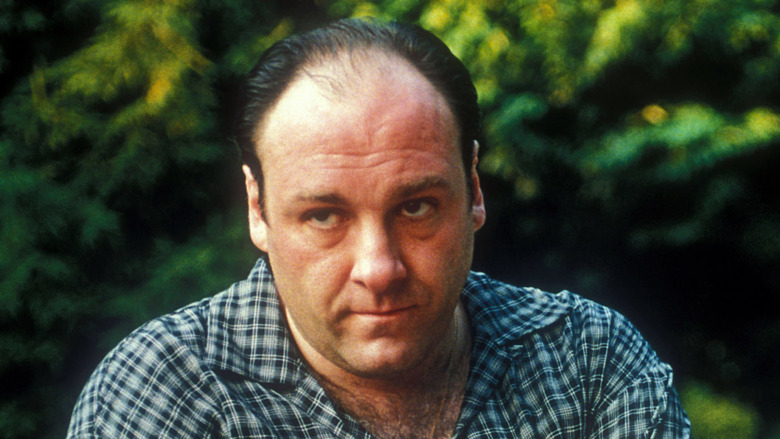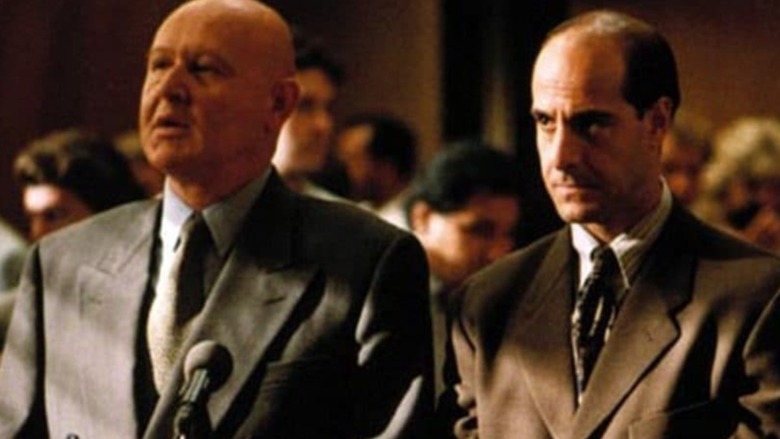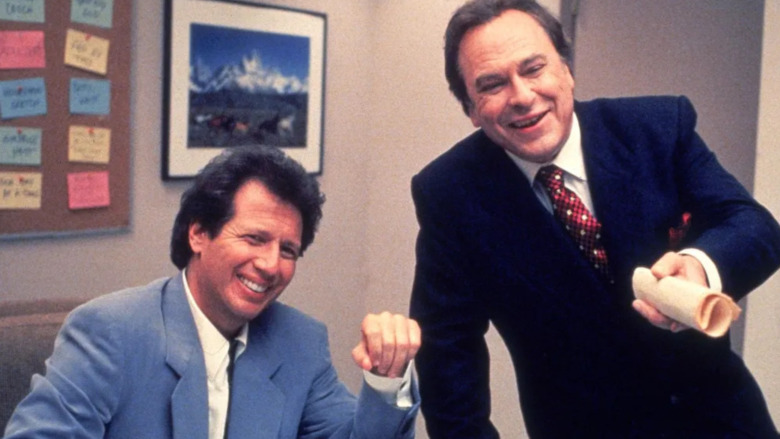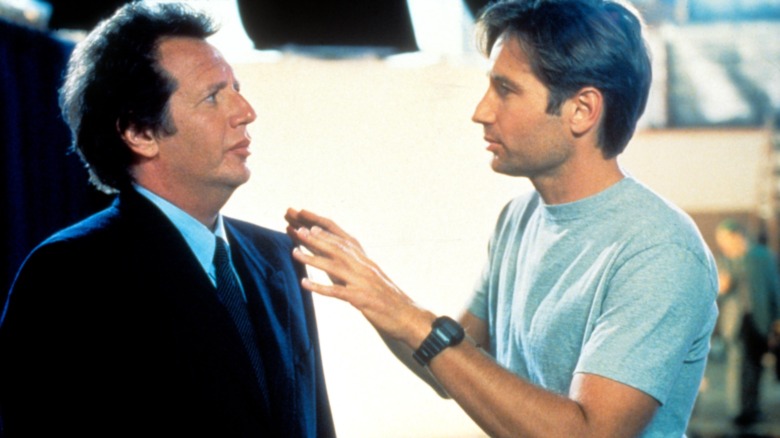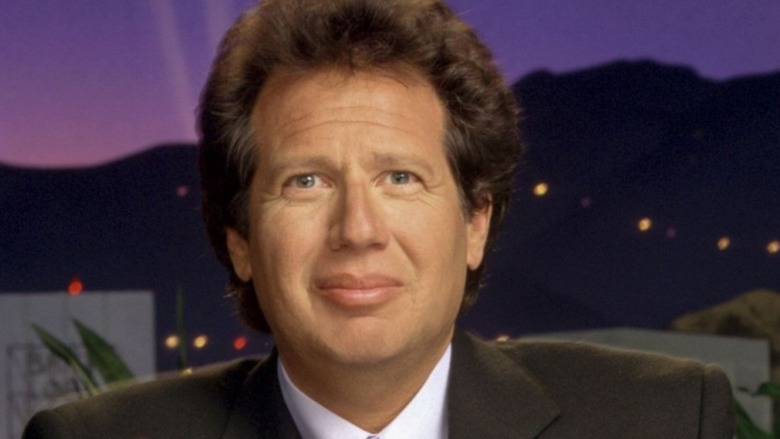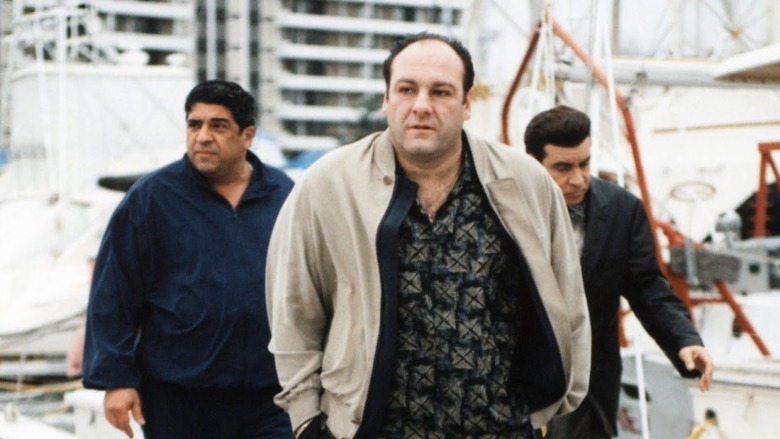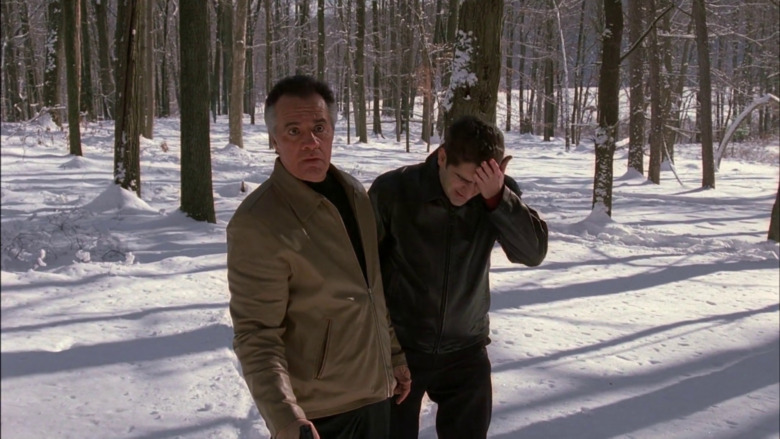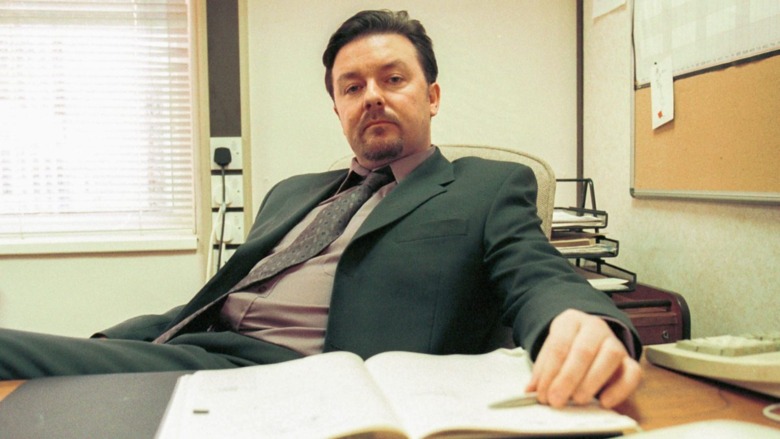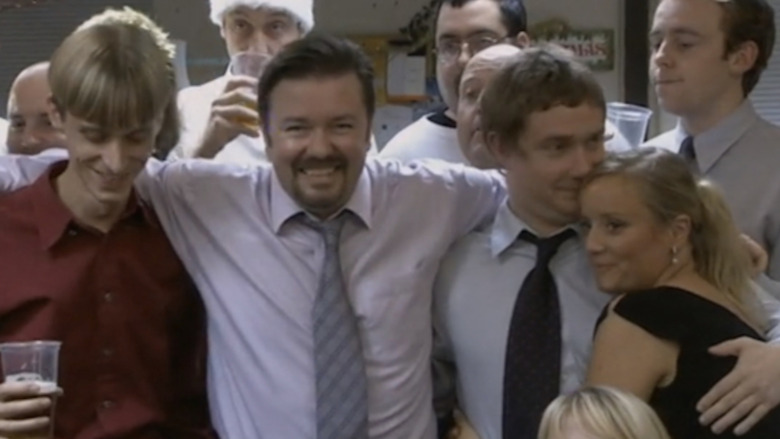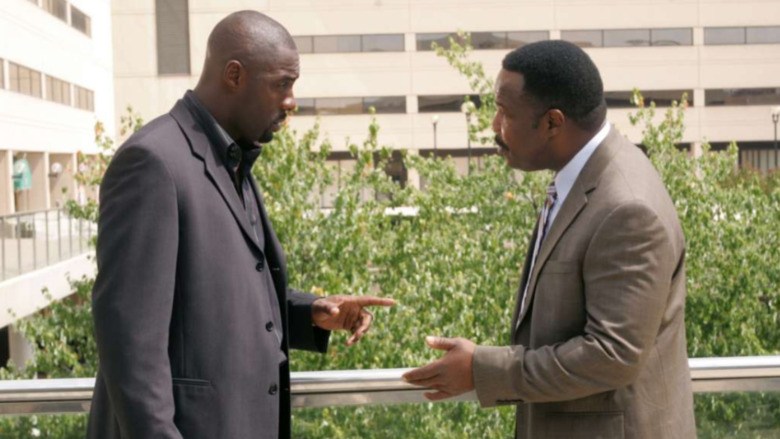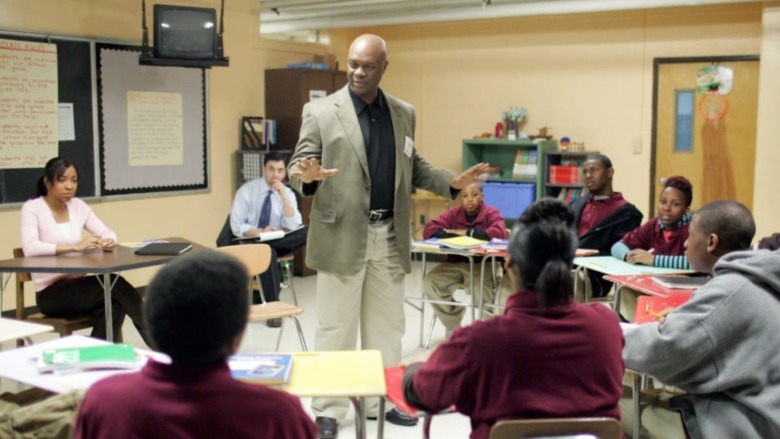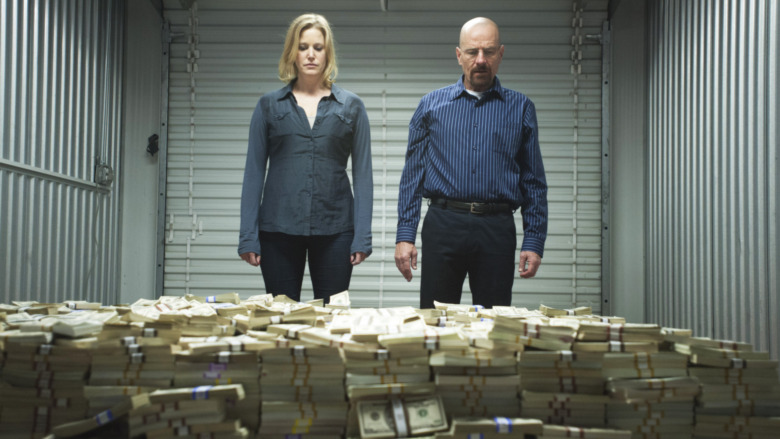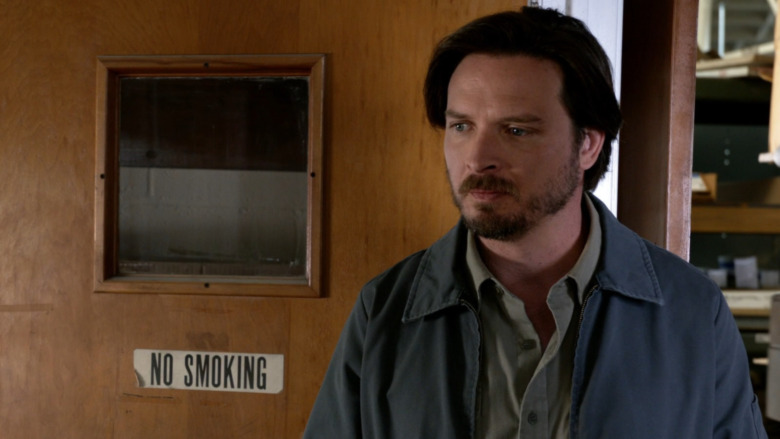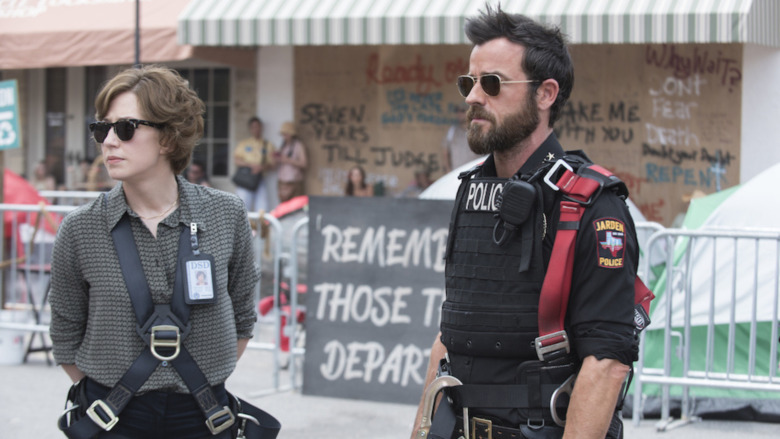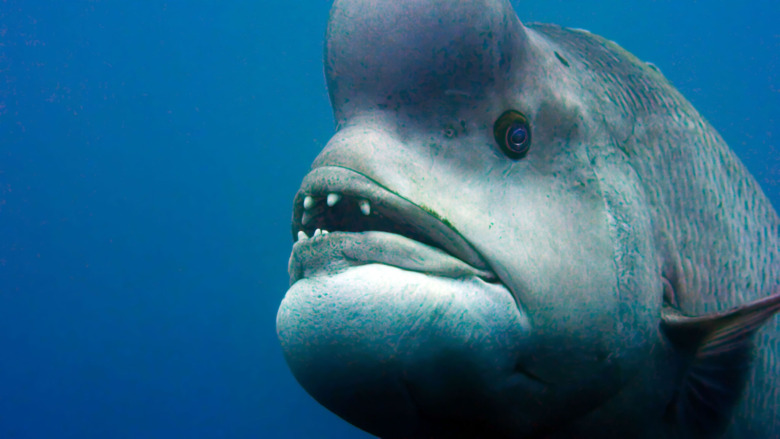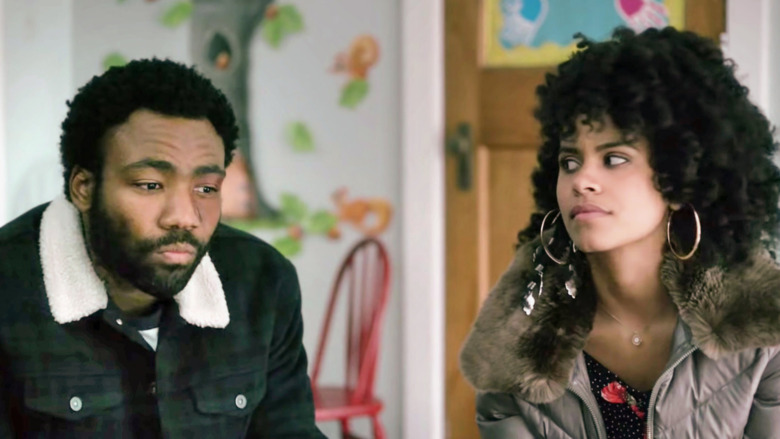There Are Only 15 Near-Perfect TV Show Seasons According To Metacritic
Metacritic is a website that aggregates reviews from critics and averages them out to get a sense of the perceived quality of the movies, TV shows, video games, and music albums, even the ones that people disagree about. Given that disagreement, very few products have anything close to a perfect score. In fact, there are only 15 television seasons that have scores of 97 or better on Metacritic. Unsurprisingly, they include a lot of the shows you've definitely heard critics praise in the last couple of decades, but maybe also one or two you haven't heard of at all.
Given how close all of these shows are to 100% perfection, we're listing them chronologically rather than by individual scores. That makes for quite a little tour of some of the most highly praised television of the last three decades. In the age of streaming, it may also serve as a guide for those in search of some great TV to watch. And while you'll probably want to start The Sopranos or The Wire with season one — even though those seasons didn't quite make this list — you'll at least go in with a sense of when they're going to hit their stride. Here are the best TV seasons of all time, according to Metacritic.
Murder One: Season 1 (1995)
Murder One premiered on ABC Television in the fall of 1995, and it was profoundly ahead of its time. The legal and crime TV shows of that era were extremely episodic — as was almost all primetime TV, in fact. Creators Steven Bochco, Charles H. Eglee, and Channing Gibson decided to try something new with Murder One. Instead of having a new case every week, the law firm Hoffman and Associates spent their entire first season focused on one murder case, with other cases the firm was dealing with playing more peripheral roles.
Fortunately, the case around which the entire season revolved was a suitably convoluted and dramatic one, featuring a teenage murder victim who had relationships with a number of powerful Hollywood men. A young Stanley Tucci made a memorable impression as one of the primary suspects, although the ultimate solution to the mystery is of course far more complicated.
Unfortunately, TV audiences just weren't ready for this shift to extreme serialization, and were left confused and lost if they missed just one episode. The second season made a bunch of changes, including shorter storylines, and the show just wasn't as good (indeed, the series wasn't renewed afterward). The long-form storytelling of Murder One may not have gone over well in 1995, but it turned out to be a glimpse of the future of scripted television. For those with the patience to stick with it, that first season really holds up, enjoying a 99% Metacritic rating.
The Larry Sanders Show: Season 4 (1995)
People often credit the launch of The Sopranos in 1999 as the beginning of "prestige television" in which HBO led the charge in raising the quality of TV writing and production to a level akin to cinema. However, HBO's run of flawless shows began not with The Sopranos, but a few years earlier with The Larry Sanders Show. Of course, people love to talk about prestige TV as if it's all dramas about troubled, difficult men, but The Larry Sanders Show wasn't that. Rather, it's a hilarious workplace comedy about troubled, difficult men.
The show started in 1992 with comedian Garry Shandling in the title role, a character based on a less-likable version of himself. Shandling was a former substitute host of The Tonight Show; Sanders was the host of a very similar long-running late-night talk show. A pre-scandal Jeffrey Tambor played his announcer/sidekick, Hank, while Rip Torn shone as the show's producer, Artie (his performance alone makes the show well worth watching). Bob Odenkirk, Janeane Garofalo, and other 1990s comedy greats played recurring characters, while other celebrities played themselves (with their personalities often pushed to self-parodic extremes) as guests on the show within a show. The list of notables includes David Spade, Dana Carvey, Carol Burnett, Robin Williams, Jim Carrey, and Alex Trebek, to name a few. The show even featured musical appearances from real bands, including the Wu-Tang Clan, Elvis Costello, Ben Folds Five, and Porno for Pyros. Written in part by a young Judd Apatow, the comedy was whip-smart and highly character-driven.
By season four, the series was really firing on all cylinders, which is why it holds a 99% rating on Metacritic. Scott Thompson joined the supporting cast as Hank's new assistant, an early gay TV comedy character (played by a gay actor, no less). Guest stars including Jeff Goldblum, Chris Elliott, and Sandra Bernhard filled out the world of the show, and provided foils for Shandling's comedy. TV critics, and anyone else paying attention, began to realize that this showbiz satire wasn't just one of the best shows on TV, it was one of the best TV shows ever — despite the controversy surrounding it.
The Larry Sanders Show: Season 5 (1996)
The Larry Sanders Show became truly great in season four, and it was still going strong in season five with a Metacritic score of 97%. Larry became threatened by the career ambitions of a young Jon Stewart, who guest-hosted his show. He also began to suspect that David Duchovny might be trying to seduce him. Sarah Silverman joined the Larry Sanders writer's room, proving that women are just as funny as men. There was even an episode that dealt with Ellen DeGeneres coming out as a lesbian, and an ill-fated push to get her to do it on Larry's show, months before she spoke to the media about her sexuality in real life. Each 22-minute episode of the season managed to pack in an impressive amount of depth behind the corny catchphrases.
Although there was continuity regarding the characters' lives from episode to episode, The Larry Sanders Show never had the kind of big season-defining storylines that define a lot of the shows on this list. What it had, however, was consistency, and a cast of regulars who were always imminently watchable, if not exactly lovable. Whoever the celebrity guest was, and whichever backstage character was highlighted, it was always very, very funny, poking fun at the foibles and frailties of oversized Hollywood egos. And Garry Shandling was always at the center, the creator and star, being sardonic, neurotic, self-absorbed — and incredibly hilarious.
The Larry Sanders Show: Season 6 (1998)
The final season of The Larry Sanders Show also makes the list with a Metacritic score of 99%, making it one of those rare series to go out on a high note. Although season six featured the supporting cast less than previous seasons, it continued to be the gravitational center of televised comedy.
Since it is a TV show about a TV show, naturally much of the final season is about the show coming to an end. Larry's contract negotiations aren't going well, he continues to find his job threatened by that young upstart Jon Stewart, and ultimately it's time to walk away. There's even a double-length final episode featuring a curtain call of guest stars, which serves as a final farewell to the real Larry Sanders Show as well as its longer-running fictional counterpart.
Larry Sanders never lost his edge, and never became soft and tamed as so many TV comedy protagonists eventually do. That's both because Garry Shandling wouldn't let him and because HBO was smart enough not to meddle (although his fictional counterpart routinely battles with interfering network executives on the show). Indeed, Shandling and co-writer Peter Tolan won a Primetime Emmy award in 1998 for writing the series finale. More than 20 years later, this show is still highly regarded by comedy fans.
The Sopranos: Season 2 (2000)
The Sopranos premiered in 1999, less than a year after Larry Sanders ended, and it soon became a bigger deal than anything on HBO had ever been. Even today, it's frequently discussed as one of the greatest TV dramas of all time, and it racked up many Golden Globe and Emmy awards over the course of its run. Years after its conclusion, it still has fans dedicated enough to host Sopranos-themed conventions.
And while the first season was great television, the second season took things to the next level. With the first season having established all of the characters surrounding mob boss Tony Soprano (James Gandolfini), as well as the problems they cause him, season two gave creator David Chase and his impressive staff of writers the space to introduce new complications and ratchet up the ever-present tensions of a life lived outside the law. It holds a 97% rating on Metacritic.
Much of the season features Tony's suspicions of his close friend and trusted lieutenant, Salvatore "Big Pussy" Bonpensiero (Vincent Pastore), who's become an FBI informant. Meanwhile, Tony's older sister Janice (Aida Turturro) returns to New Jersey, which complicates Tony's already troubled relationship with his mother (Nancy Marchand). Janice also begins a romance with Richie Aprile (David Proval), a mobster who just got out of prison and is also causing trouble for Tony and his crew.
The finale, "Funhouse," which features the troubling resolution of the Bonpensiero problem as well as a set of memorably surreal dreams, is considered a highlight of the series, and ranks highly among all TV episodes in general.
The Sopranos: Season 3 (2001)
The Sopranos' hot streak continued with season three, which gave more time to Tony's immediate family. His daughter, Meadow (Jamie-Lynn Sigler), begins college and has a relationship with a doomed young gangster. His son, Anthony Jr. (Robert Iler), finds success at high school football, but suffers the same kind of panic attacks that have plagued his father (and his grandfather, as the show reveals in a flashback). Tony's mother dies, and his Uncle Junior (Dominic Chianese) deals with a cancer diagnosis. Popular character actor Joe "Joey Pants" Pantoliano also joins the cast as obnoxious gangster Ralph Cifaretto.
Season three also features "Pine Barrens," perhaps the single most discussed episode of the series. Directed by Steve Buscemi (who later appeared on the show as Tony's cousin, Anthony Blundetto), it tells the strange and elliptical story of two members of Tony's gang, Paulie Walnuts (Tony Sirico) and Christopher Moltisanti (Michael Imperioli), becoming lost in the woods after a Russian man they were attempting to kill escapes. It approaches Beckett-esque levels of existential absurdity. They never do find their prey, and "Where's the Russian?" became something of a meme among Sopranos fans. There were even fan theories that the vengeful Russian would play a key role in the series' eventual finale, but in The Sopranos, as in life, things just aren't that simple.
The Sopranos continued to be excellent television for the rest of its six-season run, but only these two seasons — the series' apex — made this extremely exclusive list.
The Office (UK): Season 1 (2001)
While The Sopranos was going strong on HBO, a low-key series began on the BBC that would ultimately transform TV comedy in more than one country. The Office was created by Stephen Merchant and Ricky Gervais, with Gervais starring as inept office manager David Brent. Although essentially a workplace sitcom, it was presented as a mockumentary, with characters giving one-on-one talking head interviews to complement scenes of their interactions.
Brent is an obnoxious boor who thinks he's much funnier than he is. He's supported by Mackenzie Crook as the sycophantic Gareth, who doesn't respect David personally so much as the very idea of authority. Meanwhile, Martin Freeman also stars as everyman sales associate Tim, whose will-they-or-won't-they romance with receptionist Dawn (Lucy Davis) provides a story of real human emotion and pathos, in contrast to the more ridiculous antics of their boss and coworkers.
If those character dynamics sound familiar, of course, it's because they stayed pretty much the same when the series was adapted for American TV, and the characters became Michael Scott, Dwight Schrute, Jim Halpert, and Pam Beesly. But while the American version lasted for nine seasons and topped 200 episodes, as is the way on American television, it never would have existed (to say nothing of the adaptations in nine other countries) if these first six episodes of the original series hadn't been so perfect (at 98% on Metacritic).
The Office (UK): Season 3 (2003)
The original British The Office only had two seasons, and each ran for only six episodes. Two Christmas specials then served as a third season of sorts to wrap up the series, but that's all there ever was. These final two episodes alone hold a 98% score on Metacritic.
The particular cringe comedy of The Office can be a hard watch for some sensibilities — indeed, some people watch with their finger over the fast-forward button to get through the worst of it — but that's part of what makes it so compelling. Anyone who has worked in a dull, dead-end 9-to-5 will recognize the interpersonal dynamics at play, even if they're turned up to 11 here. The show's short run means it never softened the way the American version did, nor did its characters. In fact, David Brent is fired by the end of the second season. Sitting through all the awkwardness pays off, however, with an ending that redeems your hope in humanity without ever being saccharine.
To this day, many loyalists (including plenty of TV critics) regard the original as the superior version of The Office. Whether that's true or not, it's certainly the more consistent version. With such a short run, there's no time for cast members to leave or for the show to jump the shark. It's good from beginning to end, and still stands up well as a classic of British TV.
The Wire: Season 3 (2004)
Back to HBO, a frequent flier on this list. The Wire didn't start as a smash hit the way The Sopranos did, but it grew in acclaim over time, as each season expanded its lens on the city of Baltimore. After a second season focused on the harbor and corruption amongst stevedores left some viewers feeling like the show had lost its step a bit, season three came back strong, holding a 98% Metacritic rating. It returned focus to the drug empire run by Avon Barksdale (Wood Harris) and Stringer Bell (Idris Elba), while also bringing in more of the city's politics, with Aidan Gillen joining the cast as Tommy Carcetti, an ambitious city councilman who decides to run for mayor. The real-world experience and writing chops of the show's creator, David Simon, who once worked as a police reporter in Baltimore, brought a gripping, gritty realism to every episode.
A central plotline of the season involves Major Bunny Colvin (Robert Wisdom), a veteran police commander on the verge of retirement, who comes up with a desperate plan to reduce crime in West Baltimore. Without asking anyone's permission, he establishes zones in which cops under his command allow drug dealers to operate freely, reducing the violence involved in their game and giving the police more time to deal with other crimes. While his plan works and violent crime in the district genuinely decreases, the whole thing is inevitably shut down when it's discovered, and Colvin is forced to retire early. This isn't just a solid season of television; it's a sharp commentary about the futility of the War on Drugs.
The Wire: Season 4 (2006)
Season four of The Wire, regarded by many as the best of the series, maintained its focus on the cops, gangsters, and politicians of Baltimore, while also introducing a whole new cast of young characters as it expands into one of Baltimore's public schools, particularly focusing on the way some students are marked at an early age as future criminals and treated as such. Bunny Colvin even gets involved in a research project aimed at helping those exact kids.
It's easy to talk about The Wire as a show that dealt with important social issues, and to describe these seasons in those terms, but what made the show work so well was its cast of complicated and fascinating characters (and the great actors who play them). Many shows that try to tackle difficult topics end up becoming moralizing or sentimental, but the complexity of the characters — some of whom were played by non-professional actors and real-life Baltimore residents — kept The Wire from becoming too heavy-handed. For all the show had to say about crime, policing, and race in America, viewers were just as likely to tune in to see how lovable junkie Bubbles (Andre Royo) was holding up, or what kind of trouble renegade cop Jimmy McNulty (Dominic West) would get into with the bosses. The issues may have made The Wire important, but the characters made it great TV.
Breaking Bad: Season 5 (2012)
Breaking Bad, which premiered on AMC in 2008, was a series about a regular man who turns to a life of crime out of desperation and finds that he loves it. Walter White (Bryan Cranston) goes from being a high school science teacher to becoming the vicious drug kingpin known as Heisenberg. But by the fifth and final season of the show, all of that had already happened. Walter had long ago turned entirely to the dark side and was far past the point of redemption.
By Breaking Bad's final season, Walter has already memorably dealt with the menace of Gus Fring (Giancarlo Esposito), but his troubles are far from over. Its last 16 episodes track Walt's world closing in on him, and his desperate efforts to find a way to win, or at least to secure some kind of legacy for his family. He drives away his protegé, Jesse (Aaron Paul), who ultimately turns on him. He's already alienated his wife Skyler (Anna Gunn), and then his brother-in-law, Hank (Dean Norris), figures out that Walt is Heisenberg. On top of all that, Walt's cancer comes back.
As both the hero and the villain of his own story, Walt's greatest asset was his intelligence, but by the end of the series he's simply juggling too much, and his control starts to slip. The inevitable collapse, and what comes after it, make for a hell of a season of television — which is why it sits at a near-perfect 99% on Metacritic.
Rectify: Season 4 (2016)
Rectify is the story of Daniel Holden (Aden Young), who's released from death row almost two decades after being wrongly convicted of raping and killing his girlfriend as a teenager. As he attempts to adjust to living in a world he barely knows, he also becomes involved in the problems of his family and other people he encounters, even as the murder of his girlfriend is investigated anew. Drawing inspiration from true accounts of wrongfully convicted inmates on death row, the show refreshed long-running conversations about criminal justice reform. Each season of this character-driven drama was praised for its poignant, understated realism and nuance, but the show saved the best for last.
Although it's the final season of the show, season four doesn't have a conclusive ending to the story in the same way Breaking Bad's last season does. It's possible that's because the Sundance Channel was considering ordering more of the series. Regardless, it works well for Rectify, as evidenced by the season's 99% Metacritic score. It's fitting that Daniel's story doesn't have a solid ending. He just has to keep on living, day by day, like everyone else. It may never be easy, especially with his PTSD from all those years in prison, but the series ends with Daniel imagining better times, and it's heartening to think that he might one day live them out.
The Leftovers: Season 3 (2017)
While many of these shows were highly acclaimed from their first episode, HBO's The Leftovers took a little time to find its footing. Since its premise involved the sudden, unexplained disappearance of 140 million people (that's 2% of the world's population), it was bound to be a little dark. The first season, however, was criticized for just how unrelentingly grim it was (despite a tragicomic scene involving a burnt bagel trapped in a toaster — yes, carbs can carry philosophical weight).
Then it was retooled for season two, with the main action moving from upstate New York to Texas. Then the third and final season shook things up again, with a time jump and a split in the action between Texas and Australia. With each season, the show seemed to get bigger, until it became clear that The Leftovers wasn't just about how a bunch of people disappeared and the ones left behind were sad about it. It was a show about life, and death, and ultimately, everything.
Season three might have been the show's most metaphysical one, and it wasn't interested in giving viewers an easy answer about what happened to the missing people. The show had never been about that question; it was about bigger questions that don't have easy answers and never will. Ultimately, that's what made it such an amazing viewing experience, with a 98% score on Metacritic.
Planet Earth: Blue Planet II (2018)
In a huge departure from the rest of this list, Blue Planet II isn't a scripted, fictional TV show at all. It's a BBC nature documentary series, following the success of the Planet Earth series and the original Blue Planet. Narrated by Sir Richard Attenborough, and with music by Hans Zimmer, Blue Planet II uses state-of-the-art technology to capture ocean life more intimately than ever before.
This isn't your average wildlife doc. It may not have any gangsters or drug dealers causing must-see drama, but it does have colorful fish using coral to break open clam shells so they can eat, octopus hiding in oyster shells to avoid sharks, and spooky deep-sea creatures with huge, terrifying teeth luring in their prey. And of course, everything that happens on this show is real.
It also had a profound effect on the world. After the show first aired in 2017, it sparked serious and widespread concern about waste plastic polluting the ocean, leading to bans on straws and other disposable plastic products. Even people who didn't watch the show at the time probably remember when those concerns became a part of the public consciousness, kind of all at once, thanks to the final episode of Blue Planet II, which deals with plastic in the ocean. Few other TV shows can claim to have such a direct and immediate real-world impact, not to mention a 97% Metacritic rating.
Atlanta: Season 2 (2018)
Atlanta Season Two: Robbin' Season benefits, as many second seasons do, from being able to expand the show outward in weirder directions after the first season established the basic dynamics of the show. Atlanta focuses on Earn, played by series creator Donald Glover, a college dropout who becomes the manager for his rapper cousin Alfred, known as Paper Boi. Although Glover was already a star coming off of Community and his rap career as Childish Gambino, Atlanta quickly made big stars of Brian Tyree Henry, who plays Paper Boi, as well as LaKeith Stanfield, who plays his sidekick Darius, and Zazie Beetz, who plays Earn's girlfriend, Vanessa.
But the series has always been about more than just Earn and Paper Boi. It's about race, and class, and policing, and identity; all sorts of big stuff like that, and it handles its topics intelligently and often hilariously. It's about the city of Atlanta, sure, but really it's about America.
In the second season's most talked-about episode, "Teddy Perkins," Donald Glover plays the titular Teddy under truly creepy whiteface makeup, resembling late-period Michael Jackson. As Darius ventures into Teddy's mansion in an attempt to pick up a piano with rainbow-colored keys, the show departs almost entirely from comedy and basically becomes an episode-length horror movie.
Atlanta is the only show on this list that's still ongoing, although it's taken a very long gap between seasons. While there will never be a better season than the ones we've seen of wrapped shows like The Sopranos or The Wire, Atlanta may yet have new heights to reach in the future. It might even beat season two's 97% Metacritic rating.
